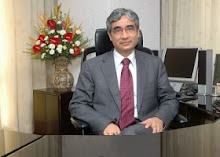RANJINI MANIAN
We tend to refer to people by the jobs they do rather than their names. This can be disrespectful, especially lower down the professional order.
We tend to refer to people by the jobs they do rather than their names. This can be disrespectful, especially lower down the professional order.
Over the last few months, I have been working with a young German intern, here to learn from India's rich experience of inter-cultural adaptations at work. The learning has been mutual. I find that life's lessons can come from anyone irrespective of their gender, generation or cultural origin. Learning is no more a one-way street. Was it ever?
My intern, let's call him Max, has offered us many insights and different takes on our views. Some of what I learnt is not strictly business, but I felt it was very valuable in the larger context of human relations.
For instance, one morning, he came to speak to me about running an errand — delivering a letter to an important leader. “Shall I drop off the letter today?” he asked.
“Yes, please, Max, do that.”
“My driver will take you there, and you can try to speak to the Executive Assistant,” I added helpfully.
“Your driver?” said Max, stopping in his tracks. “You mean Rajan?... He is a person.”
“Yes, of course, you're right, Rajan will take you,” I said hastily. And it made me think of the disconnect between what we profess and what we do in India.
We profess to have unity in diversity.
We profess to see oneness in all.
We profess to speak with respect.
Yet, every now and then, we are apt to forget the person and simply look at the job he or she is doing.
For the longest time I had been battling to establish the identity of the garbage collector who comes to my home on his rounds in the neighbourhood. People would say to each other at home, “ Kupai-karanis here” which translates as “garbage man” or “ kachada-wallah”. I would think, this man has a name given to him by his parents which defines him and is something he is proud of. Calling him by his name rather than referring to the “duty” he does would be respectful of his sensitivities. We found out he was called Ravi, and referred to him by name in due course.
But while talking to Max, I realised to my discomfiture that I had fallen into the trap of referring to a person by his “job description” rather than his actual name.
I've discussed in earlier articles the discomfort Westerners, particularly the Americans, have with being addressed as ‘Sir' or ‘Ma'am'. “Why don't our teammates just call us by our names?” they wonder. Well, it's one thing to follow our tradition of showing respect to our superiors by addressing them as “Sir” or “Doctor” or even “Boss” and another matter when we reduce a person to a role that is perceived as being of a ‘lower order'.
“Guard, I am expecting a visitor, please let the car in”; “Watchman, where can I park?” — such references are common in, say, a big apartment complex where such jobs are usually manned by a shifting population of employees and we don't take the time to find out their names.
There will be some who put up a reverse explanation about how the working class in India does not expect to be addressed by their names; they will tell you that the job description confers on them a degree of respect that being addressed by name does not provide. Yes, we Indians are comfortable using the word ‘ wallah', as in the rickshaw- wallah and the chai-wallah. We gave importance to the role, not to the individual, and the West adopted it to an extent. But times have changed. We need to learn some good points from the West. An expat client once told me in disgust about an Indian who escorted him to a meeting. The man had apparently been giving terse directions to the driver. “Left ... Second right,” and so on. His tone of voice and the fact that he was not polite while talking to the driver had irked the expat, who asked me to make sure that everyone we selected to work with him was sensitive to the dignity of others.
Let's remember this as we go around in our hi-tech cities, software parks, amazing airports and malls, and come face-to-face with the people who clean the restrooms, the people who serve the coffee, the personnel directing traffic in the car parks, and the many ‘nameless' others who keep the system running on well-oiled wheels.
When we address a person by his or her given name, we're affirming her identity. And when we take the trouble to get the pronunciation and spelling correct, as well as any honorific that may go with the name, we're offering due respect to the individual. Not to do so is unforgivable, because we're showing we don't value the person's individuality and identity.
So, whether we're referring to the famous few or the many men-in-the street, let's remember that no one is faceless or nameless. Each of us is an individual, unique and special, irrespective of our status in the social pecking order. We each come with a bit of the divine in us!
Max gave me a timely reminder, and hey, I recommit to living in awareness of this good habit. What about you, new managers?
The writer is CEO of www.globaladjustments.com. She can be reached at info@globaladjustments.co
Courtesy: Business Line





a revealing one!!! thanks
ReplyDelete